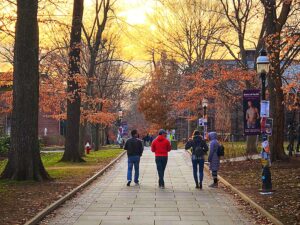What Are the Results of Test Optional Admissions?
Standardized tests have long been a part of college admissions, even as many suggested that test optional admissions were a better approach. These voices were given a boost when the Coronavirus pandemic caused a widespread cancellation or postponement of tests, and almost all colleges went test optional as a result.
We’ve written before about test optional admissions, but now that we’re two years into the pandemic, and have had two test optional admissions cycles, we’re going to look at what some of the impacts of test optional admissions have been, and how this might continue to impact your college admissions journey.
Prior Research into Test Optional Admissions
There have been prior studies of the impact of test optional admissions, though only a few selective colleges were test optional prior to 2020. A paper from 2021 analyzed the impact of test optional admissions when they were implemented by various colleges prior to 2016.
The author found that test optional admissions lead to slight increases in enrollment for Pell-Grant recipients, first generation students, and students from underrepresented backgrounds. While there were no major changes observed, these trends were present in both more and less selective institutions. Further, test optional admissions were not correlated with an overall increase in applicants.
Why this happened is debated. Allegations of bias against the SAT remain, and we investigated those in a prior article, but it is unclear if those are the cause here. It is also possible that test optional admissions make previously underrepresented students more likely to apply, although the lack of increase in applications as a whole argues against this interpretation.
In an article in Inside Higher Ed, proponents of test optional admissions argue that the study demonstrates that the tests are inherently unfair, and that ending their use will lead to a more even playing field for admissions. Proponents of the tests argue that there are systemic issues within admissions which go far beyond standardized testing, and that merely going test optional will not make college applications more fair.
Due to the small sample size of test optional colleges, there was limited data to work from, and it is possible many outside factors impacted this data. However, we were about to get a much larger sample size.
What Happens When Everyone is Test-Optional
The biggest difference between prior test optional adoptions and what we saw in 2020 is the speed and preparation the transition had. Before 2020, schools which decided to go test-optional took several years to analyze their options and make policy decisions for how they would evaluate applicants in lieu of test scores. With the dramatic and rapid switch, many schools had only months to revamp their admissions policies.
In the summer of 2021, schools were polled as to how they were impacted for the 2020-21 admissions cycle. Most schools saw an increase in applicants from low income, first generation, and underrepresented backgrounds. For all schools, the increase in applications was larger than the increase in enrolled students, though both rose.
This implies that going test optional inspired more students from these backgrounds to apply to college at all, and this created a corresponding increase in the number who ended up enrolling. The numbers were significantly higher at public schools, likely due to low income students being more familiar with these schools compared to private institutions.
While colleges were impressed by the increase in diversity this brought, some were worried about how this would stress their finances, as more students in need of financial aid applied and were admitted. While some schools have endowments large enough to fully cover all operational costs, most universities rely on tuition to some extent to fund the school’s operations. This is especially true as public funding for higher education has declined in recent years.
Evaluating Students Without Test Scores
Without standardized tests, schools focused more on grades, essays, extracurriculars, and letters of recommendation. Grades became especially important for evaluating a student’s academic potential, and some schools worried that students they let in without test scores might not be able to keep up with the work required.
Essays remain a major way schools evaluate students (if you want help writing your own essays, see our articles on the subject). A recent study by Stanford, however, showed that essay content correlated to household income even more strongly than SAT scores do.
The study examines 240,000 essays submitted by 60,000 students in University of California applications in 2016. When they analyzed the language used, they found a very strong correlation between an essay’s contents and the income of the author’s family. Thus, while test optional admissions is seen as a major boon for equity in college admissions, this study suggests that the solution is not so easily attained.
The study did not find any correlation between essay content and chances of admission, but it was not looking for that; hopefully future studies will pick up where this one left off.
The Future, and What This Means for You
While data is still being gathered about how the new trend of test optional admissions is impacting college enrollment, many colleges have decided to stay the course, and test optional admissions look set to become the norm.
While some schools are transitioning to a permanent test optional model, others are simply extending their pandemic policies, waiting to gather more data on the impacts of the program on their admissions and students before making their final decision. This is true for public and private colleges alike, and as more schools make the call to continue test optional policies, the more widely accepted they become.
Further, several states have legislated that their public colleges must offer test optional admissions, including Colorado, Illinois, and Montana. The University of California system went even further, and all of its campuses have adopted a test-blind admissions policy. While this is still not the norm, it shows an increasing acceptance of this trend.
Some critics of the new trend worry about grade inflation, and whether students who are not properly academically prepared will be accepted into college due to a lack of standardized examinations. Others, however, dismiss this worry; we will have to wait for more students to be admitted sans test scores to see if this is a legitimate reason to worry.
What we are seeing increasingly is students taking standardized tests, and then deciding based on their scores whether or not to submit them when applying to colleges. Students scoring well hope their results will give them a boost, while students doing poorly prefer to rely on their GPA alone. This is because test optional does not mean these colleges are test blind; and they will still consider your test scores if you submit them.
We recommend all of our students take the tests, because it is good to have the option to submit scores to colleges. Further, high test scores can still provide a boon to your chances for admissions. Test optional admissions policies means there is no longer as much risk associated with taking standardized tests, while still presenting a reward for performing well on them.
If you want to begin studying for the tests, and would like help in doing so, check out our article on the secrets of test prep. For more personalized guidance, check out our test prep service, or sign up for one of our test prep bootcamps. Our students see an average improvement of 180 points on the SAT, and we’re eager to help you maximize your potential score.
Final Thoughts
We’re still waiting to see all of the impacts of the Coronavirus pandemic, but one has become clear already: test optional admissions are here to stay. While more data is needed before we know the full effects of this, we believe it is beneficial to students to have more options when applying to colleges, and that this will lessen the amount of stress placed on high schoolers.
Of course, there’s more to college admissions than just test scores. If you want to learn more about how we can help you on your admissions journey, or have questions about what we do, schedule a free consultation today. We’ve helped hundreds of students find the right college, and we’re always happy to hear from you.








